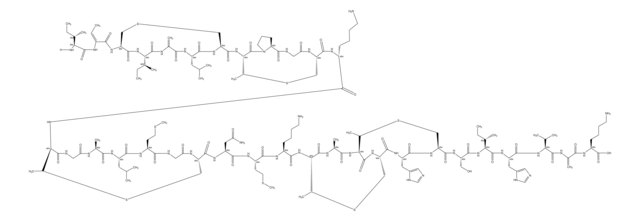Wichtige Dokumente
63978
(RS)-(Methylencyclopropyl)-essigsäure
analytical standard
About This Item
Empfohlene Produkte
Qualität
analytical standard
Qualitätsniveau
Assay
≥95.0% (HPLC)
Haltbarkeit
limited shelf life, expiry date on the label
Methode(n)
HPLC: suitable
gas chromatography (GC): suitable
Anwendung(en)
food and beverages
Format
neat
Lagertemp.
−20°C
SMILES String
OC(=O)CC1CC1=C
InChI
1S/C6H8O2/c1-4-2-5(4)3-6(7)8/h5H,1-3H2,(H,7,8)
InChIKey
QJBXAEKEXKLLLZ-UHFFFAOYSA-N
Anwendung
Verpackung
Empfohlene Produkte
Hier finden Sie alle aktuellen Versionen:
Analysenzertifikate (COA)
Die passende Version wird nicht angezeigt?
Wenn Sie eine bestimmte Version benötigen, können Sie anhand der Lot- oder Chargennummer nach einem spezifischen Zertifikat suchen.
Besitzen Sie dieses Produkt bereits?
In der Dokumentenbibliothek finden Sie die Dokumentation zu den Produkten, die Sie kürzlich erworben haben.
Unser Team von Wissenschaftlern verfügt über Erfahrung in allen Forschungsbereichen einschließlich Life Science, Materialwissenschaften, chemischer Synthese, Chromatographie, Analytik und vielen mehr..
Setzen Sie sich mit dem technischen Dienst in Verbindung.







